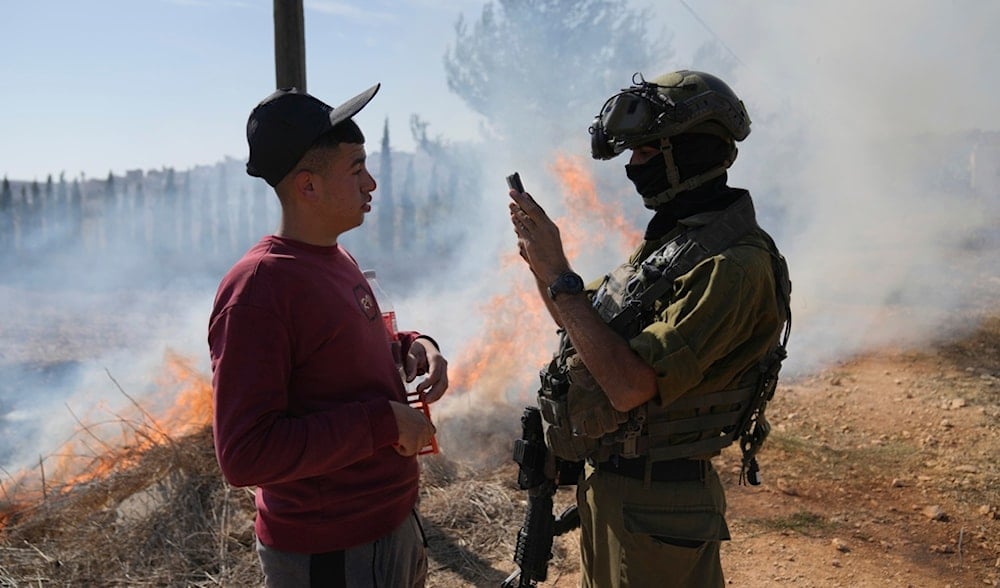Settlers intimidating olive farmers in West Bank: Plot for annexation
Israeli settlers and soldiers in the West bank target Palestinian harvesters not only for their crops, but to force them out of their villages and expand illegal settlements on their lands.
-

An Israeli occupation soldier checks the identification document of a Palestinian villager, in the West Bank town of Qusra, south of Nablus on October 29, 2024. (AP)
Farmers in this historic West Bank town of Deir Istiya, surrounded by miles of olive trees, extending to the valley and filling its gardens, report being unable to harvest much of their essential olive crop this year due to an escalating campaign of harassment and violence from nearby Israeli settlements and outposts.
Ibrahim Abu Hijleh, a 30-year-old farmer whose grove is just 200 meters from the Revava settlement, said he was only able to access his olive trees for a few hours in November, with the help of Israeli activists and a Palestinian-Israeli member of parliament.
He said, "I got about 10% of the harvest, and now we need to trim and tend the trees," adding, "I keep trying to go back, but people come from the settlement and tell us to leave and threaten us."
In November, the United Nations reported a substantial increase in Israeli settler violence against Palestinians in the West Bank during the 2024 olive harvest season. Attacks resulting in casualties or property damage were at least three times higher than in the previous three years.
Between October 1 and November 25, the UN recorded 250 settler-related incidents across 88 West Bank communities, resulting in 57 Palestinians injured by settlers and 11 by Israeli occupation forces. Over 2,800 olive trees were damaged or destroyed, and there was widespread theft of crops and harvesting tools.
The Yesh Din Israeli NGO reported a significant rise in violence targeting Palestinian olive harvesters in October, documenting 80 incidents across 42 Palestinian villages, including the village of Bayt Lid near the Einav settlement.
According to Yesh Din, these attacks involved shootings, violent assaults, threats, expulsion of harvesters, prevention of harvesting, crop theft, equipment theft, and the uprooting of olive trees.
Yesh Din also noted that Israeli security personnel were present during 85% of these incidents but did not intervene to stop the attacks.
The most notable incident occurred in October when a 59-year-old woman was killed while harvesting olives in Faqqua, near Jenin, by a soldier who fired multiple shots at her.
Plot for annexation
Olives are the West Bank's most important agricultural product, with up to a third of the Palestinian population involved in olive cultivation or the production of olive oil and soap. Before October 7, 2023, the olive harvest in occupied areas of the West Bank was usually coordinated between local Palestinian authorities and the Israeli military to allow farmers access to their groves on specific dates. However, after the attack, Palestinians say their access to farmland has been severely restricted.
This year, some restrictions were officially eased, with farmers reportedly allowed to access olive groves within 200 meters of illegal Israeli settlements. However, farmers in Deir Istiya reported that they were still frequently obstructed by settlers or the IOF, who invoked "closed military zone" orders to prevent their access.
Khaled Yusuf Abu Hijleh, the deputy mayor, said "Olives are 90% of our economy as a town. We have a few oranges and lemons but they, too, are surrounded by settlements and very difficult to get to... There have been problems for a long time. The bigger the settlements get, the more pressure they exert. It’s our land."
Furthermore, a severe economic crisis has been impacting Palestinians in the West Bank, with unemployment at record levels and the poverty rate doubling to 28%, according to data issued by the World Bank.
It is worth noting that harassment and intimidation of Palestinian farmers differ from one to the other; some can access their groves with so little as a warning from an Israeli occupation soldier, while others cannot harvest any of their crops due to Israeli threats.
Despite international calls to curb settler violence, the occupation government, which includes far-right parties with strong ties to the settlement movement, continues to support settlers and their claims.
Last month, extremist and far-right Israeli Finance Minister Bezalel Smotrich claimed that Donald Trump's election provided the occupation with a unique opportunity to expand illegal settlements in the West Bank.
Activists argue that attempts to disrupt the olive harvest are part of a broader strategy to force Palestinians off their land and pave the way for annexation. Aviv Tatarsky, an Israeli solidarity activist, explained that the goal is to make areas like grazing lands and olive groves unsafe for Palestinians, as these spaces are vital for their livelihood.
Many olive groves in Deir Istiya lie between settlements, including Ariel, the largest in the area, with over 20,000 residents. In October, the UK imposed sanctions on a settler outpost for supporting activities that violate Palestinians' rights. Settlers, however, claim they are acting in self-defense against attacks from villagers.
The olive harvest holds deep cultural significance, beyond its commercial value. It is a time of celebration and hard work, with the olive tree being a long-standing symbol of Palestinian identity and nationalism. Ayub Ibrahim Abu Hijleh, a 54-year-old farmer from Deir Istiya, expressed that for Palestinians, "Olives mean life and land," and noted that settlers understand the symbolism of the olive tree as well.

 5 Min Read
5 Min Read








